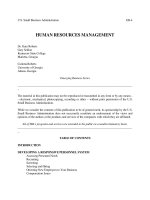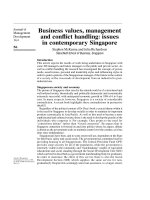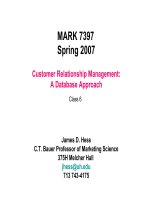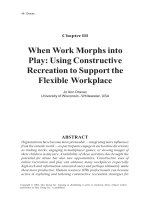Tài liệu People-Focused Knowledge Management: How Effective Decision Making Leads to Corporate Success docx
Bạn đang xem bản rút gọn của tài liệu. Xem và tải ngay bản đầy đủ của tài liệu tại đây (3.26 MB, 392 trang )
Further Praise for People-Focused Knowledge Management
“Drucker may point the way of a knowledge economy, a knowledge business, a
knowledge worker, but Karl Wiig instructs us precisely how to take advantage of a
dynamic knowledge strategy. In People-Focused Knowledge Management, he sim-
plifies the complex, makes the concepts relevant and actionable and leaves the
(inevitable) results to us. Finally, we have a resource for creating a compelling knowl-
edge value proposition linking economics, behavior and technology. For decades, his
remarkable graphics and penetrating analysis has been a cornerstone for manager-
ial excellence in all corners of the globe and all sectors of the economy. Few can
match his roots and vision in this field; and no one will be disappointed with this
newest triumph.”
— Debra Amidon, Founder and CEO, Entovation International,
Ltd., and Author of The Innovation Superhighway
“Melding theory with application, Wiig has created an invaluable ready reference
for everyone who works in the knowledge management arena. He is uniquely qual-
ified to provide such a thorough and thought-provoking analysis of the role of
knowledge and knowledge management in meeting the business challenges that we
all face.”
— Alex Bennet; Mountain Quest Institute; Co-Author of Organizational Survival
in the New World: The Intelligent Complex Adaptive System; former Chief
Knowledge Officer of the U.S. Department of the Navy
“This book distills the practical and theoretical wisdom of one of the true pioneers
in the field of Knowledge Management. The constant interplay of case analysis and
fundamental propositions signals the coming of age of the discipline. It takes sea-
soned practitioners and students alike to the strategic and systematic perspective of
management that is required to release the power of knowledge in action.”
— Francisco J. Carrillo, Professor of Knowledge Management, Center for
Knowledge Systems, ITESM
“In People-Focused Knowledge Management, Karl Wiig goes beyond the boundaries
of traditional knowledge management and integrates this with recent cognitive
research on such diverse subjects as mental models, narrative, conceptual blending,
decision theory, and sense making, in a very comprehensive treatment.”
— Steve Denning, Author of The Springboard
“Karl Wiig’s understanding of the human and organization dynamics of KM is
unsurpassed. His decades of experience and insight are captured in this seminal
work.”
— Carla O’Dell, Ph.D., President, APQC
“When it comes to weaving together theory and practice, Karl Wiig is a master!
People-Focused Knowledge Management illustrates this beautifully. In it he inte-
grates management philosophy with company specific illustrations, cutting edge epis-
temological theory with specific knowledge management strategies, and current
psychological research with operational details. The depth of Wiig’s analysis is
unusual, and the fact that he carries the analysis all the way to concrete actions
makes this book an especially valuable addition to the growing literature on knowl-
edge management. A feast for the mind as well as the enterprise!”
— Sue Stafford, Professor and Chair, Department of Philosophy, Simmons College
PR.qxd 5/3/04 2:31 PM Page i
This page intentionally left blank
People-Focused
Knowledge Management
PR.qxd 5/3/04 2:31 PM Page iii
This page intentionally left blank
People-Focused
Knowledge
Management
How Effective Decision
Making Leads to
Corporate Success
Karl M. Wiig
K
NOWLEDGE
R
ESEARCH
I
NSTITUTE
, I
NC
.
AMSTERDAM • BOSTON • HEIDELBERG • LONDON
NEW YORK • OXFORD • PARIS • SAN DIEGO
SAN FRANCISCO • SINGAPORE • SYDNEY • TOKYO
An imprint of Elsevier
PR.qxd 5/3/04 2:31 PM Page v
Elsevier Butterworth–Heinemann
200 Wheeler Road, Burlington, MA 01803, USA
Linacre House, Jordan Hill, Oxford OX2 8DP, UK
Copyright © 2004, Elsevier Inc. All rights reserved.
No part of this publication may be reproduced, stored in a retrieval
system, or transmitted in any form or by any means, electronic,
mechanical, photocopying, recording, or otherwise, without the prior
written permission of the publisher.
Permissions may be sought directly from Elsevier’s Science & Technology
Rights Department in Oxford, UK: phone: (+44) 1865 843830, fax:
(+44) 1865 853333, e-mail: You may also
complete your request on-line via the Elsevier homepage
(), by selecting “Customer Support” and then
“Obtaining Permissions.”
Recognizing the importance of preserving what has been written, Elsevier
prints its books on acid-free paper whenever possible.
Library of Congress Cataloging-in-Publication Data
Wiig, Karl M.
People-focused knowledge management : how effective decision making
leads to corporate success / Karl M. Wiig.
p. cm.
Includes bibliographical references and index.
ISBN 0-7506-7777-5 (pbk. : alk. paper)
1. Knowledge management — Social aspects. 2. Organizational
effectiveness. 3. Organizational learning. 4. Decision making.
5. Corporate culture. 6. Organizational behavior. I. Title.
HD30.2.W52 2004
658.4¢038–dc22
2004005921
British Library Cataloguing-in-Publication Data
A catalogue record for this book is available from the British Library.
ISBN: 0-7506-7777-5
For information on all Butterworth–Heinemann publications
visit our Web site at www.bh.com
04050607080910 10987654321
Printed in the United States of America
PR.qxd 5/3/04 2:31 PM Page vi
C
ONTENTS
Acknowledgments, xvii
Preface, xix
Foreword, xxi
Chapter 1
Competing in the Global Economy Requires
Effective Enterprises 1
Premise 1-1: The Global Economy Demands Excellence, 1
The Competitive Enterprise Example, 1
The Global Economy Challenge, 4
The World Requires Us to Change, 6
Knowledge-Intensive Work, 7
The Misunderstanding of Knowledge-Intensive
Work, 7
Knowledge Intensity, 8
Work Is Becoming Increasingly Complex and Valuable, 9
Complex Work Creates Greater Value, 12
The Six Major Challenges, 12
Four Management Initiatives, 17
Enterprise Effectiveness Requires Good Intellectual
Capital Assets, 19
Examples of Structural Intellectual Capital, 22
The Role of Knowledge Workers, 23
vii
PR.qxd 5/3/04 2:31 PM Page vii
Chapter 2
The Effective Enterprise 26
Premise 2-1: Individual Actions Lead to Overall Enterprise
Performance, 26
Premise 2-2: Effective Enterprise Behavior Leads to
Success, 26
The Proactive and Decisive Company Example, 26
Management Philosophy, 27
Management Choices, 27
Knowledge-Related Practices and Actions, 28
Resulting Behavioral and Cultural Traits, 29
The Company’s Business Results, 29
What Does It Mean That an Enterprise Is Effective?, 29
Good Enterprise Performance Results from Effective
Personal Actions, 31
Effective Enterprises Rely on Broad and Deep
Knowledge, 33
What Is Successful Enterprise Performance?, 34
External and Internal Enterprise Effectiveness, 35
Success and Knowledge-Intensive Work, 36
The Importance of Information Technology, 36
Productivity Is Not Always What We Expect!, 37
Different Kinds of Productivity, 38
Value Creation and Productivity, 39
A Systemic Model of Enterprise Performance, 40
Changing Enterprise Performance Takes Time, 42
Characteristics of the Effective Enterprise, 44
Six Success Factors for the Effective Enterprise, 46
Six Behaviors of the Effective Enterprise, 51
Successful Performance Is Durable, 55
Performance Is a Function of Many Factors Acting
Simultaneously, 58
The Intellectual Asset Management Mentality, 59
Building and Exploiting Intellectual Capital Assets
Are Important, 60
People Adopt New Mindsets!, 61
viii
Contents
PR.qxd 5/3/04 2:31 PM Page viii
Chapter 3
Actions Are Initiated by Knowledgeable
People: People Make Decisions and Act
Using Different Kinds of Mental
Functions 63
Premise 3-1: The Machinery of the Brain Metaphor Is a Useful
Beginning, 63
Premise 3-2: The Mind-As-Machine Metaphor Does Not Cover
Everything, 63
The Personal Reasoning Example, 64
Have We Misunderstood How People Think, Make Decisions, and
Act?, 65
Thinking, Reasoning, and Knowledge, 69
Associations and Biases Govern Our Actions, 72
Information Is Not Knowledge!, 73
The Purpose of Knowledge Is Action; the Purpose of
Information Is Description, 73
On Information, Knowledge, and Discontinuity, 76
Good Reasoning Matches Knowledge and Information, 77
Knowledgeable and Informed Decisions Deliver
Performance, 80
Goal-Directed Reasoning Relies on Goals, Information,
and Knowledge, 81
Personal Knowledge Is Built from Mental Models, 83
On Mental Models, 85
Many Mental Models Are Based on Metaknowledge, 86
The Importance of Metacognition, 87
The Importance of Implicit Learning, 89
The Personal and Enterprise Knowledge
Evolution Cycle, 89
The Needs to Increase People’s Knowledge, 93
Knowledge Required to Act Effectively, 93
Examples of Approaches to Develop Mental Models
in People, 96
Contents
ix
PR.qxd 5/3/04 2:31 PM Page ix
x
Contents
Chapter 4
Mental and Structural Reference Models 100
Premise 4-1: People Imitate Prior Behaviors, 100
Premise 4-2: Organizations Re-enact Past Practices, 100
The Personal Memory Example, 100
Mental Model Preview, 102
Personal Reference Models, 102
Reference Models Are Stories!, 105
Why Are Stories Important?, 107
It Is Always Hard to Grasp the Whole Coherently, 107
Stories Are Unsurpassed for Effective Communication, 109
We Rely on Stories to Tackle New Problems, 110
Stories Help Us Learn Better, 110
Stories and Mental Simulations, 111
Organizational Reference Models, 114
Leaders Create Powerful Reference Models, 115
Chapter 5
A Knowledge Model for Personal
Situation-Handling 117
Premise 5-1: Situation-Handling Requires Action, 117
Premise 5-2: Good Situation-Handling Is the Result of
Effective Actions, 117
Personal Situation-Handling: A Customer Service
Example, 118
Introduction to Personal Situation-Handling, 118
The General Context, 120
The Knowledge-Based Situation-Handling Model, 122
The Customer Service Example Revisited, 125
The Four Situation-Handling Tasks, 126
Sensemaking and Situational Awareness, 127
Sensemaking, 127
Situational Awareness, 128
Decision-Making/Problem-Solving and Action Space
and Innovation Capability, 131
Decision-Making, 131
Single-Stage and Multistage Decision-Making, 133
PR.qxd 5/3/04 2:31 PM Page x
Mental Simulations, 135
Problem-Solving, 135
Action Space, 140
Innovation Capability, 141
Implementation and Execution Capability, 142
Implementation, 143
Execution Capability, 143
Monitoring and Governance Competence and
Perspectives, 144
Monitoring, 144
Governance Competence and Perspectives, 147
The Expert and the Novice: When Situations Are Not
as First Believed, 147
Story-Based Models Provide Situation-Handling
Knowledge, 148
Topic Domain Knowledge, 149
The Mental Reference Models in
Situation-Handling, 150
Understanding Adjacent Operations, 152
The Relevance of General and World Knowledge, 152
Chapter 6
Enterprise Situation-Handling 155
Premise: Individual Situation-Handling Actions Lead to
Consolidated Enterprise Behavior, 155
The Enterprise Situation-Handling Example, 155
The Situation, 155
Information Gathering, 155
Sensemaking, 156
Understanding the Situation, 157
Decision-Making/Problem-Solving and
Action-Selection, 158
General Aspects, 159
Introduction to Enterprise Situation-Handling, 160
The Four Enterprise Situation-Handling Tasks, 162
Sensemaking and Its Situational Awareness, 167
Sensemaking in the Enterprise, 168
Enterprise Situational Awareness, 170
Contents
xi
PR.qxd 5/3/04 2:31 PM Page xi
Decision-Making/Problem-Solving and Action Space
and Innovation Capability, 172
Enterprise Decision-Making, 175
Enterprise Problem-Solving, 177
Enterprise Action Spaces, 181
Enterprise Innovation Capabilities, 183
Implementation and Its Execution Capability, 186
Implementation in the Enterprise, 189
Enterprise Execution Capability, 191
Monitoring and Governance Competence and
Perspectives, 192
Monitoring in the Enterprise, 194
Enterprise Governance Competence and
Perspectives, 198
Enterprise Situation-Handling Has Many Levels, 200
The Importance of the Situation-Handling Model, 200
Enterprise Situation-Handling Model Insights, 202
Why Should We Be Concerned with Details?, 204
Appendix: Action Program Details of the Enterprise
Situation-Handling Example, 206
Chapter 7
People-Focused Knowledge Management
in Daily Operations 213
Premise 7-1: Knowledge Drives Enterprise Performance, 213
Premise 7-2: Knowledge Must Be Managed, 213
Premise 7-3: Effective Knowledge Management Must Be People-
Focused, 213
Premise 7-4: Six Factors Determine Personal Knowledge-Related
Effectiveness, 213
The Vigilant Knowledge Company Example, 214
New Generation Knowledge Management, 216
New Generation Knowledge Management Is Different, 218
New Opportunities Require New Efforts and
Directions, 222
Perspectives on New Generation Knowledge
Management, 222
Deliberate and Systematic Knowledge Management, 225
New Generation Knowledge Management Foci, 227
xii
Contents
PR.qxd 5/3/04 2:31 PM Page xii
People Focus, 227
Enterprise Focus, 228
Technology Focus, 230
The Bar Has Been Raised — NGKM Implications, 230
Starting the Knowledge Management Practice, 231
Problems with Conventional Knowledge
Management, 234
New Generation Knowledge Management Challenges, 235
Knowledge-Focused Mentality and Corporate Culture, 237
The Enterprise Culture, 239
Four Key Knowledge Management Thrusts, 240
The Power of Role Models, Examples, and Practices, 240
Making Everybody Understand, 241
Understanding the Enterprise Direction and Context, 241
The Service Paradigm, 242
Knowledge-Related Effectiveness and Efficiency, 245
Knowledge Effectiveness and Efficiency, 245
Knowledge Effectiveness, 245
Knowledge Efficiency, 245
Knowledge Management Effectiveness and Efficiency, 246
Knowledge Management Effectiveness, 246
Knowledge Management Efficiency, 246
Chapter 8
People-Focused Knowledge Management
Expectations 248
Premise: People-Focused Knowledge Management Supports Global
Excellence, 248
The Global Leader Example, 248
What Future Knowledge Management Business Users May
Expect, 252
The Business Environment Is Under Pressure, 254
Success Relies on Knowledgeable Behavior, 255
Expected Knowledge Management Developments, 257
The Changing Workplace, 263
Knowledge Will Be Bought and Sold, 266
Societal Side-Effects, 267
We Are Far From Finished!, 268
Contents
xiii
PR.qxd 5/3/04 2:31 PM Page xiii
New Enterprises and Integrative Management, 269
Objectives of Integrative Management, 270
In Complex Businesses, Better Practices Are Required, 272
Intellectual Work Is Indeed Complex, 273
How Do We Implement Integrative Management?, 274
Final Thoughts, 276
Our Present Direction, 276
The Societal Conundrum — What Shall We Do?, 278
Appendix A
Examples of Knowledge Management
Analysis Approaches 281
Knowledge Vigilance Survey Approaches, 281
Knowledge Surveys and Knowledge Audits, 283
Knowledge Assets Mapping — Intellectual Capital
Inventorying, 283
Knowledge Landscape Mapping, 284
Knowledge Mapping (K-MAPs), 286
Competitive Knowledge Analysis, 287
Knowledge Flowcharting and Analysis (KFA), 287
Knowledge Diagnostics, 288
Critical Knowledge Function Analysis (CKFA), 289
Knowledge (Management) Benefit Assessment (KBA), 290
Information Technology-Based KM Tools, 293
Appendix B
Examples of Knowledge Management Practices
and Initiatives 298
General Business Focus, 299
Intellectual Asset Management Focus, 299
Innovation and Knowledge Building Focus, 300
Knowledge Sharing and Information Transfer Focus, 301
Information Technology-Based Knowledge Capture and Delivery
Focus, 302
20 Knowledge Management Initiatives and Practices, 303
xiv
Contents
PR.qxd 5/3/04 2:31 PM Page xiv
Appendix C
Memory and Knowledge Categorizations 312
Human Memory Organization, 312
Working Memory, 314
Medium-Term Buffer Memory, 317
Long-Term Memory, 318
Procedural Memory, 319
Conceptual Memory, 319
Episodic Memory, 320
Semantic Memory, 320
Lexical Memory, 321
Encyclopedic Memory, 321
Priming Memory, 322
Abstract Knowledge Objects, 323
Routines, Operational Models, Scripts, Schemata,
General Principles, and Metaknowledge, 323
Routines, 323
Operational Models, 324
Scripts, 325
Schemata, 325
General Principles, 326
Metaknowledge and Metacognition, 326
Metacognition, 327
Glossary, 329
References, 347
Index, 357
Contents
xv
PR.qxd 5/3/04 2:31 PM Page xv
This page intentionally left blank
A
CKNOWLEDGMENTS
This book could only be possible by the continued support by
Elisabeth, my wife of many decades, who with her own research,
deep insights, and collaboration has encouraged my investigations
and allowed me to channel my efforts into this venture.
I am also grateful for the support of Serina Lai and her associates
at Angel Net Universal Company, Ltd.
For the insights and contents of this book, I thank my many clients
and professional collaborators over the past 40 years. They have
continually pointed me in directions — and shown me solutions —
that for the most part would have eluded me. I am particularly
indebted to those organizations, some with which I have not worked,
that by their examples demonstrate the enduring power of leadership
that combines people-friendliness with business savvy, requirements
for perfection, and intolerance for foul play.
Several of my teachers of the past changed and broadened my per-
spectives, providing lasting influences, even though some encounters
were brief. I particularly wish to recognize Russel Ackoff, the late
Donald Ekman, Edward Lawler, and Irving Lefkowitz.
I am also beholden to the researchers and thinkers in many fields
whose works have influenced and strengthened my convictions. They
made it possible to “stand on their shoulders,” and many of their
contributions are referenced in this book.
The book includes examples and case histories without attribu-
tions. Most are modified to fit the topics they illustrate, and some
might be recognized by their originators. I am thankful for their
contributions.
xvii
PR.qxd 5/3/04 2:31 PM Page xvii
This page intentionally left blank
P
REFACE
This book is based on some fundamental beliefs about what makes
a great enterprise:
Organizational performance is primarily a result of effective
actions by knowledgeable people (Pfeffer 1995), and therefore
good knowledge management is crucially important.
People act effectively when they understand situations and the
contexts within which they operate, are motivated, and have
appropriate resources.
When people are treated “right,” productivity advantages may
exceed 25 percent (Lawler 2003).
Employees imitate as role models their leaders whose behavior
reflects their basic philosophies.
All employees must be held accountable for their actions, and
everyone must be part of the enterprise’s governance.
People Acquire, Possess, and Use Knowledge in
Remarkable Ways!
This book builds its case on our present understanding of how
people work with their minds, the role of knowledge in conducting
work, and how that translates into effective actions for the enter-
prise, the people themselves, and other stakeholders. It also builds on
understanding recent cognitive science and management theories,
resulting in new insights that have replaced conventional thinking
and in premises such as the following:
Conceptual integration (blending) of prior knowledge into new
mental models that are applicable to new situations represents
a unique human aptitude — not a preprogrammed function that
operationalizes prior knowledge as has mistakenly been
xix
PR.qxd 5/3/04 2:31 PM Page xix
suggested by “Mind-as-Container” or “Mind-as-Machine” and
similar metaphors (Bereiter 2002; Fauconnier & Turner 2002).
Expertise is a tacit and abstract personal capability used to inno-
vate, learn, act, and blend mental models and judge situations
from theoretical and practical perspectives. It is not a result of
an extensive “content of a mental filing cabinet” (Bereiter 2002).
Innovation is a tacit mental function that involves conceptual
integration or blending (Fauconnier & Turner 2002).
To a much greater extent than was realized earlier, decisions are
made by tacit activation of mental models that reflect experi-
ences of similar situations when those situations are understood
by the decision maker (Bechara et al. 1997).
In the workplace, as in life, education in the knowledge era
must provide deep understanding. Teaching cannot continue to
provide just facts and shallow understanding sufficient “to tell
what was told” (Bereiter 2002).
Mental models range in abstraction from concrete routines,
operational models, scripts, schemata, and general principles to
highly abstract metaknowledge.
Mental models are basically converted stories in the form of
encoded descriptions of static scenes, dynamic episodes, proce-
dures for work, complex situations, and so on.
Stories provide integrated models for creating a cohesive under-
standing of complex domains.
Stories are crucial for sharing understanding, acquiring and
institutionalizing structural intellectual capital, providing effec-
tive education, and conducting knowledge diagnostics.
People learn and remember stories and concepts better
than facts.
xx
Preface
PR.qxd 5/3/04 2:31 PM Page xx
F
OREWORD
At the beginning of the twenty-first century, there is increasing
evidence that the world sees the human mind as the new frontier.
Mind-altering medications such as Prozak are commonplace. In two
consecutive issues recently, Time magazine provided multipage arti-
cles supported by colorful pictures based on functional magnetic res-
onance imaging (fMRI) to illustrate mental functions that may be
improved or changed to our benefit (Stein 2003; Gorman 2003).
These and many other events indicate that we are clearly expected to
better manage aspects of how we use or influence our minds to func-
tion, giving better performance and better quality of life.
Ever so slowly, we see that the general interest in the new frontier
is penetrating the corporate world, although thinkers like Peter
Drucker, Charles Handy, and Arie de Geus have told us so for
many years. We are beginning to understand how we can provide
stewardship and facilitation to make people work more intelligently
and more effectively by building and making available knowledge
and conducive work environments, cultures, and resources. However,
most managers still consider technology and other physical resources
to be critical success factors instead of focusing on the human
mind. As long as they do not know how to “manage knowledge,”
they will find it simpler to focus on aspects that can be seen and
counted.
In today’s world each business and enterprise is constantly required
to change; to be reinvented in order to provide new capabilities and
perspectives; to be able to cope with new challenges; and to renew
itself to adopt new approaches, keeping those that work well and dis-
carding those that are outdated. All these changes are required, but
at the same time we are reminded that we need to provide stable
work conditions and set our strategies to support innovation in
both traditional business areas and new “destructive” business areas
in the interest of providing competitive advantages in tomorrow’s
world. These are considerable challenges that private companies,
xxi
PR.qxd 5/3/04 2:31 PM Page xxi
nongovernmental organizations, and nation states face — even indi-
viduals who seek to work in challenging positions. Those who step
up to the challenges will likely survive, whereas those who shy away
from them are likely to fail. To thrive and prosper will require con-
siderable management skills and involvement of new professional
skills such as knowledge management (KM). It will also require the
adoption of management philosophies and practices that emphasize
the facilitation of effective work environments and performance-ben-
eficial cultures.
No one suggests that management is simple or easy. Even under
the best of circumstances — when nothing much changes and busi-
ness goes well — managers must coordinate complex intertwined
social, business, human, and mechanical processes. But such ideal
conditions rarely exist. The real world — particularly today —
involves constant changes on nearly every front. Customers, sup-
pliers, competitors, products, services, employees, technologies, reg-
ulatory environments — the economic playing field itself — all tend
to change. Changes include improvements and opportunities as well
as external and internal challenges and problems. In this turmoil,
managers at every level do their best not only to “keep the ship
afloat” but also to improve performance to remain viable and suc-
cessful. Under these circumstances, management is indeed difficult
and complex. The old adage of “keep it simple stupid” (KISS) does
not seem to work. Worse, KISS may often do harm by inappropri-
ately narrowing the focus and ignoring significant implications.
Many try to circumvent challenges and requirements by manipula-
tion and the creation of false impressions. Those who insist on fol-
lowing such paths frequently find themselves in serious trouble, as is
evidenced by many recent examples.
Old mainline approaches to business management and operations
have less validity. Vibrant and novel management approaches and
operational practices need to be pursued. Many of these have been
practiced in outstanding organizations for centuries, although new
perspectives and scientific findings provide additional foundations
and conceptual supports.
The business environment itself is changing. Globalization and
increased competition are emerging with new driving forces result-
ing from more sophisticated consumer populations. The new world
is upon us, as numerous companies and public institutions realize.
It has significantly changed the attitude of stakeholders of all kinds,
of employees, of customers, of suppliers, of whole regions and
countries where the economy and quality of life are supported by
xxii
Foreword
PR.qxd 5/3/04 2:31 PM Page xxii
industries and institutions. Investors and sponsors of public institu-
tions are changing their understanding of what constitutes appropri-
ate operation. In many instances, it is realized that the complete
approach to conducting business must be changed when the goal is
survival and success. Business must be reinvented to build new value-
creating paradigms, processes, products, and services. This is par-
ticularly important in the developed countries in Europe, North
America, Australia, and parts of East Asia to support their quality
of life.
In this environment, Knowledge Management provides a particu-
lar opportunity to help people work more effectively and intelligently
in support of the enterprises in which they invest their own and their
families’ future and on which they depend for their livelihood.
Sharper competition between companies, between countries, and
between continents result in requirements for greater effectiveness of
operations and service to customers and for creation of new pro-
ducts and services. There is increased understanding and agreement
that the major driving force in this new environment is knowledge
— that is, both personal and structural knowledge and other forms
of intellectual capital assets. However, the situation is more complex
than just building and applying knowledge. Competitiveness in the
new world is directly dependent not only on the value and sophisti-
cation of the knowledge assets but also on how well they are renewed
and utilized to conduct competent work. Consequently, it is neces-
sary to deal directly with how people and organizations create and
utilize the knowledge and understanding — know-how and thinking
strategies — in their daily work lives. We need to learn and apply
how these intellectual capital assets are engaged to analyze situations,
make decisions, and execute actions to the enterprise’s and indi-
vidual’s best advantages.
Neither these issues nor the approaches to deal with them are
simple or straightforward, and our insights are limited. Hence, many
of the perspectives expressed in this book will be subject to debate
and change as we learn more. Models and philosophies for what
makes enterprises successful vary widely. No two enterprises are the
same or have identical requirements. To allow for such disparities,
we examine basic knowledge-related premises for what makes the
enterprise effective and viable. We will explore what it means to “act
effectively.” We will study factors and conditions that promote and
maintain effective-acting behaviors and prevent dysfunctional ones.
We will examine what it means for an enterprise to achieve “durable
viability.” We will focus on many aspects of how situations can be
Foreword
xxiii
PR.qxd 5/3/04 2:31 PM Page xxiii
handled effectively. We will discuss how Knowledge Management can
assist in achieving enterprise objectives. And we will explore some of
the implications that may be expected from better people-centered
Knowledge Management. In the appendices, we introduce models for
implementing KM in proactive organizations and for showing what
is required of KM professionals in terms of services provided and
expertise needed.
Views vary on the economic and social roles of the enterprise, as
well as on the relative importance of the roles and behaviors of key
individuals and business leaders. Nevertheless, an emerging school of
thought bases success and viability on business ethics and properly
prepared and motivated individual contributors. That view is
pursued here. It is our belief that motivated, contributing, and
accountable knowledge workers are the linchpins that secure and
sustain the successful operation of the enterprise machinery.
However, they must be supported by well-designed organizational
structures and infrastructures. They must also be provided with
leadership and role models to help guide their behaviors.
Managing knowledge and managing in general are intricate
endeavors that require the manipulation of human, social, and eco-
nomic systems that are only partially understood. From systems-
theoretic perspectives,
1
organizations are complex open systems
2
that
cannot be fully observed and therefore cannot be identified. As a
result, these endeavors cannot be controlled in any strict sense or
even to our specifications.
3
Yet, we need to manage them — influence
them — in order to shape their behavior and performance, bringing
them closer to the desired objectives and expectations.
Unfortunately, some managers try to run their organizations with
strict rules in the belief that a highly ordered operation will become
“Newtonian” and that it can be controlled with practical means.
National leaders have also pursued such philosophies and continue
to do so. To some extent, legal systems and laws are designed to
channel behavior to be predictable and not just appropriate.
Organizations vary greatly, and since they cannot be fully observed
it is difficult, if not impossible, to perform rigorous investigations of
processes such as the use of knowledge and how people think to
determine what works, what does not work, and what may be
improved to work better. However, in order to achieve effective per-
formance, we still need to determine good approaches — particularly
knowledge-related methods — as best we can.
As a result, in this book we present suggestions for what can be
done and what may be expected from different actions under various
xxiv
Foreword
PR.qxd 5/3/04 2:31 PM Page xxiv









